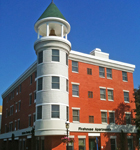At a Glance
Location
Philadelphia, PA
Founded
2008
Employees
4
Specialty
Culturally informed, researched-based architectural design
Annual Sales
More than $2 million
Design shouldn’t be solely driven by aesthetic intentions, says Ramla Benaissa, PhD, AIA, LEED AP, but needs also to be “about creating places that respond to human needs, whether physical, such as the quest for comfort and nature, or intangible, such as memory, narrative, and history.” Benaissa practiced in Montreal, Quebec, as well as for a major firm in Philadelphia before founding her own firm, Ramla Benaissa Architects (RBA), in 2008. Also located in Philadelphia, RBA specializes in residential, commercial, and hospitality projects with a goal to build upon Benaissa’s academic background through an innovative design process based on research.
“Design is not about creating shapes,” she says. “The core ideas behind our design choices are the human factor and its milieu, whether it is an urban fabric or a natural landscape. Extensive research allows us to apprehend the full complexity of a project’s conditions and go beyond the received notions of program and context.”
RBA is committed to sustainable design with a focus on LEED-certified projects. “Sustainability is about being conscious of the impact architecture has on its environment and understanding the role that materials and technology can play in creating spatial conditions that are human, sustainable, and ecological,” Benaissa says.

One of the firm’s LEED projects in the works is the 18th Street Building in Philadelphia. Set in one of the city’s notable urban neighborhoods—the historic Rittenhouse Square District—the project entails the transformation of an existing multistory apartment building into an innovative and environmentally responsible residential structure through green retrofitting.
“Our intention was to emphasize the adaptive possibilities of the existing building by incorporating its character and qualities within a technologically advanced and contemporary design,” Benaissa says. “The challenge was to take a historic apartment building and remodel the residences not only to ensure that they [would] meet the health and safety requirements but also to create attractive spaces.”
RBA is committed to a sustainable approach abroad as well, as evidenced by a master plan project the firm recently undertook in Benghazi, the second largest city in Libya. Known as the Rehabilitation and Development of the 23rd of July Lake, Western Lake, and El-Keish Lake, the project involves shaping a particularly challenging landscape containing three adjoining bodies of water located at the heart of the city and in close proximity to the Mediterranean Sea. The lakes are important nesting areas for endangered migratory bird species. “The initial scope was to design the landscape around the lakes, and it evolved quickly toward a project that would position Benghazi for ecotourism and create an important historical, ecological, and cultural venue at the heart of a dense urban fabric,” Benaissa says.

The design incorporates more than 320 acres of natural and urban parkland, a bird habitat, an environmental museum, cafes, a plaza fountain, play areas, and an outdoor performance space. It was also essential to conceive a sustainable approach that could help foster growth in the fragile ecosystem’s hot, dry climate.
“We selected exclusively native plants and trees that will shade 75 percent of the park when they mature, and wetland areas were preserved to restore the ecosystem and provide a safe and sustainable habitat for the birds,” Benaissa says. “The park also includes an aviary habitat, bird-watching towers, and an educational structure to raise environmental awareness.” In short, it’s yet another exemplary project that captures the best practices of the young—and thriving—firm. ABQ


